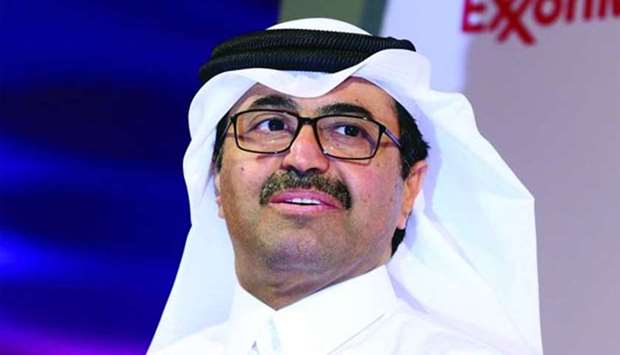Committing 24 Opec and non-Opec producers to a production cut of 1.8mn bpd in December 2016 was a “landmark” agreement, said HE the Minister of Energy and Industry Dr Mohamed bin Saleh al-Sada.
“It has made a difference”, al-Sada said in his introductory remarks at The Abdullah Bin Hamad Al-Attiyah International Energy Awards ceremony at the Museum of Islamic Art on Monday night.
“When we embarked on the mission to bring an order to the oil market, we had negative sum game with the world’s GDP growth languishing at near 3%. Brent oil has climbed from a dismal $28 per barrel in early 2016 to nearly $75 last week.
“Now, we have a healthy, nearly balanced market with a win-win situation for all. The world is experiencing synchronous economic expansion of 3.8%; great going indeed”, al-Sada noted.
Complimenting Opec secretary general Mohamed Sansui Barkindo, the winner of the 2018 Al-Attiyah award for “Lifetime achievement for the advancement of Opec”, al-Sada said, “Opec is in Mohamed Barkindo’s blood. He has been Nigeria’s Opec National Representative for a record 15 years, and has also served his country as Opec governor. In 2006, he was also acting Opec secretary general.
“When he came in as Opec secretary general in August 2016, he literally hit the ground running; the challenge was immense. After years of oversupply, the price of oil was very low. The challenge was to bring together Opec members, who had different priorities to have a unified vision on rebalancing the market.
“This challenge was further magnified as it was considered that in addition to Opec, the non-Opec producers were to be convinced to join this effort, to make it effective.”
Al-Sada said, “We needed to address the challenge and come up with expeditious solution. And, who was better placed than him? Opec was his second home. Well versed in the affairs of Opec, he was the right person at the right time. He was elected by a secret ballot as opposed to traditional consensus, setting a precedent.
“I have many treasured memories of His Excellency during that momentous second half of 2016. One of them being our meeting in Doha in early September, when we passionately talked about navigating a path to help resurrect the industry from the downturn that had gone on too long.
“I found him up to the challenge; he capitalised on his experience, ably supporting me during Qatar’s presidency of Opec in 2016. An excellent team player, he helped to convince everyone to attend an informal consultation meeting on the sidelines of the IEF Ministerial Meeting in Algiers during September 2016.”
Al-Sada recalled that Barkindo was a “valuable catalyst” in support of this marathon meeting.
“We were able to achieve consensus and Opec members agreed to turn it to a formal extraordinary meeting, which culminated in the Algiers Accord. It further paved the way for signing of the two landmark agreements – the Vienna Agreement in November and the Declaration of Cooperation between Opec and some non-Opec oil producing countries in December 2016.”
“When we embarked on the mission to bring an order to the oil market, we had negative sum game with the world’s GDP growth languishing at near 3%. Brent oil has climbed from a dismal $28 per barrel in early 2016 to nearly $75 last week.
“Now, we have a healthy, nearly balanced market with a win-win situation for all. The world is experiencing synchronous economic expansion of 3.8%; great going indeed”, al-Sada noted.
Complimenting Opec secretary general Mohamed Sansui Barkindo, the winner of the 2018 Al-Attiyah award for “Lifetime achievement for the advancement of Opec”, al-Sada said, “Opec is in Mohamed Barkindo’s blood. He has been Nigeria’s Opec National Representative for a record 15 years, and has also served his country as Opec governor. In 2006, he was also acting Opec secretary general.
“When he came in as Opec secretary general in August 2016, he literally hit the ground running; the challenge was immense. After years of oversupply, the price of oil was very low. The challenge was to bring together Opec members, who had different priorities to have a unified vision on rebalancing the market.
“This challenge was further magnified as it was considered that in addition to Opec, the non-Opec producers were to be convinced to join this effort, to make it effective.”
Al-Sada said, “We needed to address the challenge and come up with expeditious solution. And, who was better placed than him? Opec was his second home. Well versed in the affairs of Opec, he was the right person at the right time. He was elected by a secret ballot as opposed to traditional consensus, setting a precedent.
“I have many treasured memories of His Excellency during that momentous second half of 2016. One of them being our meeting in Doha in early September, when we passionately talked about navigating a path to help resurrect the industry from the downturn that had gone on too long.
“I found him up to the challenge; he capitalised on his experience, ably supporting me during Qatar’s presidency of Opec in 2016. An excellent team player, he helped to convince everyone to attend an informal consultation meeting on the sidelines of the IEF Ministerial Meeting in Algiers during September 2016.”
Al-Sada recalled that Barkindo was a “valuable catalyst” in support of this marathon meeting.
“We were able to achieve consensus and Opec members agreed to turn it to a formal extraordinary meeting, which culminated in the Algiers Accord. It further paved the way for signing of the two landmark agreements – the Vienna Agreement in November and the Declaration of Cooperation between Opec and some non-Opec oil producing countries in December 2016.”


